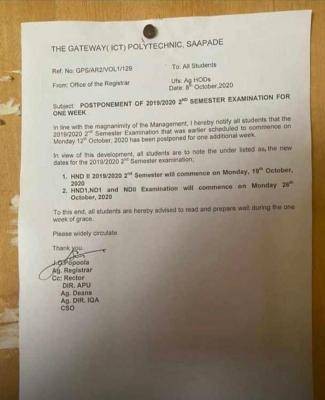
Once in a while, in moments of rhetorical flourish, a Nigerian politician — or maybe just a leader of thought — gratuitously advises young Nigerians to strive to be “employers of labour” rather than consistently seeking to be employees.
They usually give this magnanimous counsel against the backdrop of the unemployment situation in the country as if to explain that graduates cannot get jobs because they lack the culture of enterprise; as if the harshness of the prevailing economic situation is not primarily to blame.
I wonder, if it were so easy to be an employer of labour, how come those who pontificate in this manner are almost always politicians or at least, political patrons? Why have they themselves not set up industries? Besides, what is wrong with starting out in life as an employee at least to acquire some experience since nobody goes to the tertiary institution to study experience?
But what the counselors hardly take into account is the various circumstances in which people go through school and how they conspire to make the children of Sisyphus out of them. You can hardly think of doing great things when you have to contend with an anomalous environment. With the kind of challenges Nigerian undergraduates face all the time, inventing even a pencil sharpener will be the last thing on their minds. Certainly, passing through tough conditions is part of the process of getting a good education but the ones the Nigerian undergraduates face are too unsophisticated to prepare them for a rapidly advancing world.
It is no longer news that an undergraduate, Mark Zuckerberg, created Facebook and it has made him about the youngest billionaire in the world. Zuckerberg is not alone; there are many university students all over the world doing great things either by revolutionary inventions or simply designing the little ones that make the world a much easier place to live. In 2011, three students from Johns Hopkins School of Engineering designed a pen-sized device that can screen pregnant women and newborns in developing countries to detect potentially life-threatening conditions such as gestational diabetes and anaemia. They aim to make the technology affordable to the poorest woman in the poorest country. There are plenty of efforts like that in many countries of the world but where is the Nigerian undergraduate in all these?
The various news items about the Nigerian tertiary institutions show a worrying pattern. There is hardly news of serious inventions by the Nigerian undergraduate; where is the encouragement for them to do so? And it is not that Nigeria lacks bright undergraduates; the system simply crushes their initiatives.
The average Nigerian undergraduate is unduly harassed.
We can start from the case of Ibrahim Momodu, a student of University of Benin, who was brutally killed recently in circumstances involving the Police. In University of Uyo, another student was killed — and this time too, accusing fingers were pointed at the Police — during a protest.
There was also the case of the four students of Nasarawa State University, Keffi, who were gunned down during a demonstration. The facts leading to their deaths remain contested as both the Police and the Army officials deployed to the scene of the protest pushed blame to each other like ping-pong. In the past few days, we have been fed gory stories of Nigerian undergraduates involved in clashes among bloodthirsty cult groups. Sadly, all of the reports are those of this year alone.
It is interesting to note that a number of deaths on campus occurred during demonstrations. In most cases, the students were protesting the simple basic amenities any university should be able to furnish the students with in 2013.
The recent death of four student union leaders was equally disheartening. They were killed in an automobile crash while returning from Uyo on a peace-chasing mission. Just last year, three student leaders also lost their lives in a car crash while returning from Governor Olusegun Mimiko’s inauguration in Akure, Ondo State.
The recent protest by students of University of Lagos was over the exorbitant rates of goods charged by the vendors. In Usman Danfodio University, Sokoto, students protested over poor supply of electricity and water. In the case of Nasarawa University where four tragic deaths occurred, the students were also protesting the scarcity of water and power outage they had been experiencing on the campus for days.
In Anambra State University, students also protested the killing of two of their colleagues by armed robbers. Their chant was that despite the amount of money paid to the school, the authorities had not provided enough security. Their protest also included the ever-recurring issue of power supply.
These days, I am put off when I run into news reports of voyeuristic journalists excitedly reporting the “undergraduate prostitute syndrome” or another Nollywood film gazing at the activities of “Aristo girls.” Usually, either medium predictably fails to critique the culture of undergraduate prostitution beyond the usual level of banal sermonizing. Really, how come they do not see how the overall culture of deterioration of the “ivory” in “Ivory Tower” feeds into the entire collapse of the social and moral infrastructure of the system? It is so bad that you have cases of lecturers going to female hostels to harass girls for sex and the hapless victims who cannot summon the university to their side have had to resort to self-help. They trap the lecturers, naked, and place their pictures on the Internet for all of us to see. But beyond that, what else? What laws have been enacted to protect female students from overactive male lecturers? It is all so shameful.
It is devastating that while undergraduates elsewhere are being empowered with cutting-edge technology and the accompanying knowledge, the ones in Nigeria still grapple with basic issues. If they spend so much time, energy and mental resources dealing with issues of power and water supply, police harassment, cults, and various mundane issues, when are they going to have time to do great things?
The Nigerian government is forever setting up one university after the other but neglects to improve on the experience of those who go through the existing ones, let alone improve upon the facilities in the existing universities. They forget that the university experience is one of the most mentally stimulating periods of one’s life.
If it is mostly unpleasant, it causes a limitation that becomes difficult to undo later in life.




